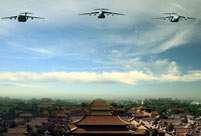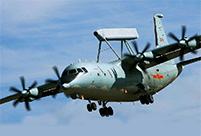 Top 100 beauties in the world!
Top 100 beauties in the world!
 Gallery: Who is the most beautiful one?
Gallery: Who is the most beautiful one?
 If you like autumn, put your hands in the air!
If you like autumn, put your hands in the air!
 Fan Bingbing's "Queen style" in new play
Fan Bingbing's "Queen style" in new play
 Lingerie show at 2014 Miss China
Lingerie show at 2014 Miss China
 J-10 fighters show aerobatic stunts in smog-free sky
J-10 fighters show aerobatic stunts in smog-free sky
 Charming contestants of Shanghai Int’l Model Contest
Charming contestants of Shanghai Int’l Model Contest
 Most amazing chi-pao beauties
Most amazing chi-pao beauties
 7 deadly animal attacks
Russia to launch 70 Proton rockets by 2020: official
7 deadly animal attacks
Russia to launch 70 Proton rockets by 2020: officialAgreement addresses China's rising demand for meat and dairy products
Chinese consumers may be licking their lips at the prospect of more high-quality food being available on supermarket shelves following an unprecedented agreement signed by agriculture tycoons from China and Australia on Monday.
The agreement has been joined by about 50 enterprises from each country. It will boost investment in Australian agriculture, including livestock, to meet soaring Chinese demand for high-quality and safe lamb, mutton, beef and dairy products, Liu Yonghao, chairman of New Hope Group, a leading global agribusiness, said in Canberra.
Liu and Andrew Forrest, chairman of FMG/Minderoo Group, signed the Executive Agreement on Agricultural and Food Safety 100 Year Partnership of Chinese and Australian Enterprises, also known as ASA 100, in the presence of President Xi Jinping and Australian Prime Minister Tony Abbott.
The food sold to China will be of the highest quality and "marked under one brand and under one logo", said Forrest, who co-chaired the ASA 100 framework with Liu.
"We'll defend the logo and brand in China. If someone wants to take that brand and put it on cheaper, low-quality food, we will defend ourselves from that," he said.
Liu said ensuring food safety is a priority for China, and Chinese enterprises hope to bring the experience of one of the world's leading food producers to China.
Besides New Hope Group, other industry heavyweights, including a leading producer of beverages, Wahaha, also joined the initiative, Liu said.
ASA 100 members will also include federal, state and territorial ministers and major food producers and distributors from each country. They will meet annually, Xinhua News Agency cited The Australian newspaper as saying.
Liu said such initiatives result from the highly complementary economies of China and Australia. According to Forrest, while China's demand for high-quality meat and dairy products exceeds supplies, Australia produces "too much food for too limited a market".
"I want to multiply, absolutely multiply, the amount of food Australia produces for the people of China. The only way to do that is to get the industries in both countries talking to each other, cooperating and becoming good friends. That's what I said the ASA 100 is achieving," Forrest said.
China has seen a surge of imported food in recent years because of recurring food scandals and demand from the growing middle class. But Forrest said earlier that he was struck by the lack of Australian food in China's large supermarkets, especially when compared against New Zealand's dairy products, which are readily available in China.
The market for baby formula in China is booming, with revenue likely to hit 191 billion yuan ($31 billion) by 2017, more than double last year's. Meat consumption per person is projected to double in China by 2020.
Zhang Haisen, an expert on international agricultural cooperation at the University of International Business and Economics, said the agricultural initiative has unprecedented scale and will be an ongoing benefit to China, whose domestic production has been limited by fodder and food safety concerns.
Chinese agricultural trade will gradually be replaced by cooperation on investment, technology and livestock breeding, said Zhang, adding that Australia could revive its husbandry industry, which is sluggish due to low prices in the global market, by tapping China's vast market.
 Hot girls at motor show
Hot girls at motor show  Official trailer of Y-20
Official trailer of Y-20 Photos: Xi Jinping in Fujian
Photos: Xi Jinping in Fujian Standard faces for each countries
Standard faces for each countries China-made military transport aircraft gets ready
China-made military transport aircraft gets ready World Pole Dance Championship in China
World Pole Dance Championship in China Shocking! Photos of Chinese fighters revealed
Shocking! Photos of Chinese fighters revealed 59-year-old Liu Xiaoqing still looks stunning
59-year-old Liu Xiaoqing still looks stunning  In pics: PLA stages live-fire drill in NE China
In pics: PLA stages live-fire drill in NE China  Top 10 most dangerous jobs in the world
Top 10 most dangerous jobs in the world  Top 10 fifth generation jet fighters in the world
Top 10 fifth generation jet fighters in the world Top 10 Chinese goddesses
Top 10 Chinese goddesses  Top 20 hottest women in the world in 2014
Top 20 hottest women in the world in 2014 Top 10 pure beauties in showbiz
Top 10 pure beauties in showbiz  Top 10 world's highest-paid models 2014
Top 10 world's highest-paid models 2014 The most gorgeous Chinese women
The most gorgeous Chinese women Top 10 most handsome faces in Asia
Top 10 most handsome faces in AsiaDay|Week|Month